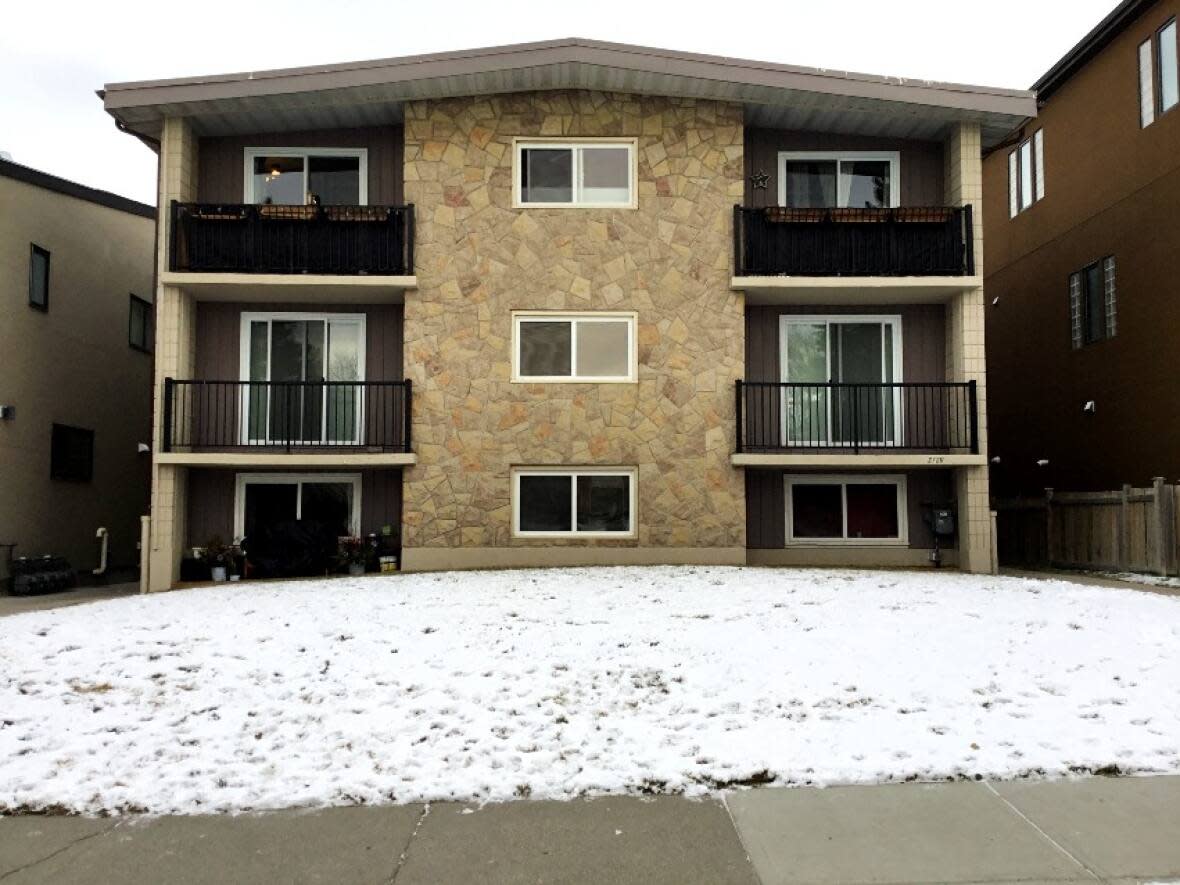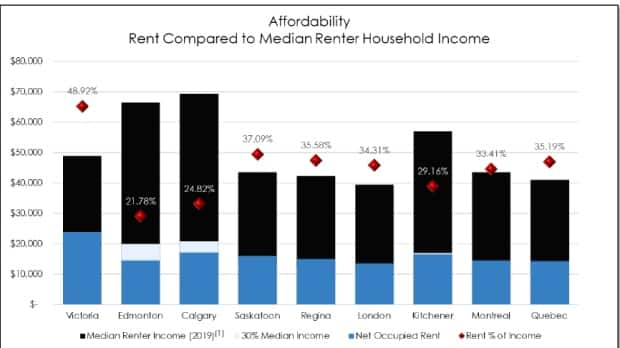Insiders warn of crunch coming for Calgary rental market with prices expected to go even higher

Calgary's tight rental market is likely going to get worse for renters before it gets better, say industry insiders.
With more people moving to Calgary and demand soaring, new units have been going far faster than they were before.
"It looks like we're heading toward a crunch," says Chris Ollenberger, a development consultant best known for his role in planning East Village.
He says if the trends stay the way they are, Calgary will see almost no new units available in about a year — the fall of 2023. And that will create shortages, further pushing up rents throughout the system.
"The rental competition is probably not going away for the next year or two," said Ollenberger. "So if you've got a good landlord and you like your location — unless you really have cause to go out into the wilderness, I'd probably stay put."
Ollenberger normally advises clients in the development industry. But CBC Calgary contacted him to get advice from a renter's perspective as part of our community-driven news project on housing.
This fall, renters in our text messaging community have been reporting months of searching and rent increases of several hundred dollars, especially as they search for new places. With vacancy rates dropping, they're also facing lineups to view units, new upfront fees just to apply and some say they're searching for months to find something when they've got a tight budget.

A recent report from Rentals.ca noted that listed rents for two-bedroom units in Calgary jumped 17 per cent in the past year to an average of $1,771.
"I'm fed up now. It's just wasting my time," said Mohammed Pari, who works in the restaurant industry.
A four-month search for a basement suite under $1,000 a month yielded nothing, even though he contacts up to four landlords per month. It makes him doubt his decision to return to Canada from India.
"If I had known, I wouldn't have come back."
Too few rentals being built
Ollenberger gets his numbers from CMHC rental market data, economic forecasts and by keeping track of local projects. He says that for the past six years, the Calgary rental market filled an average 800 new units a year. This year, it's on track to absorb 2,000 units.
There are more buildings currently under construction — a result of demand and the new federal/CMHC programs to support rental, says Ollenberger. But that's still not enough, and too few behind them lining up construction cash.
He hopes the crunch will spark a broader debate about a critical shortage of rental housing.
So why is the market so tight?
Historically, Calgary has had lower rates of renting and fewer purpose-built rental units than most other Canadian cities. It also has had more dramatic swings in rental prices and vacancy.
And now it's also a market going through significant changes.
Haig Basmadjian grew up in Calgary and now works as a senior associate in multi-family properties with Avison Young. He says Calgary's rental market, small as it was, used to be dominated by individual landlords and small-scale companies — mom and pop shops, basically.

Starting roughly 20 years ago, companies such as Mainstreet Equity, Boardwalk and Avenue Living among others, began buying up older stock, the townhouses and apartments built in the 1950s through the 1980s.
They renovate the buildings and raise rents.
"These larger companies, with very sophisticated and very capable renovation schedules, are going to the marketplace to acquire properties en masse. It's really changing the landscape very, very quickly," said Basmadjian.
Nationally, many housing advocates and some academics have blamed this process and large landlords for the lack of low-rent homes in the private market. Certainly, those are disappearing.
As of the 2021 census, Calgary has only 4,000 units left that are priced between $500 and $750 a month, and less than 15,000 units priced between $750 and $1,000 a month, out of 151,000 total rentals in the city.
Non-subsidized rental units in Calgary
But others in the field argue the real issue is limited rental supply.
They say the landlords don't raise rent based on cost. They raise rents because, when demand is high, renters will still choose their unit over the next one.
Tom Davidoff, associate professor at UBC's Sauder School of Business, sums up this dynamic: "Most landlords make as much money as they can."
Demographics changing demand
Demand in Calgary has been growing for several reasons. Basmadjian says it's driven by demographics: more people are aging into their senior years and starting to rent again, plus the millennial generation is renting in higher numbers than the generations before.
But it's also driven by immigration. More people are moving to Calgary looking to rent — both from other provinces and as part of Canada's goal to bring in more than 465,000 immigrants a year.
Corporate landlords — those who give investors a peak at the predictions — don't think this demand is going down any time soon. Investor reports promise increased profits in a market that still has lots of room for rents to grow before the average renter can't pay.
Boardwalk, for example, told investors in its Q3 update that the rent it charges in Calgary is still only 25 per cent of the median household income for renters. Its rental revenue was up 5.7 per cent since January, more than twice the increase in operational costs for its 5,879 local units.
What's great news for investors is often tough news for renters.

'Something's gotta give'
Ollenberger says he expects additional supply — more companies breaking ground on new buildings — perhaps this summer, when the economic and political environment may have stabilized.
But it likely won't be enough to resolve the increasing demand.
"There have been problems throughout Canada, including Calgary," Ollenberger said.
He blames community resistance to even well-intentioned multi-family rental projects, at least in part, and believes the coming crisis could help force a change in thinking.
"In Canada as a whole, not just Calgary, I think we're going to enter a bit of a cultural change where everybody says, 'Yeah, we really actually are quite short of housing.'
"We need to make a change as a society about how we deliver and accept new housing and new people. The immigration targets from the federal government are huge. So something's gotta give. One of those things that's gotta give is production of new housing."
Finding Home
This fall, CBC Calgary has been asking Calgarians about housing. What has been your experience in this market, and are there solutions you'd like to see a reporter dig into?
Text us to share your thoughts and experience. It's free and confidential. Unsubscribe any time.


